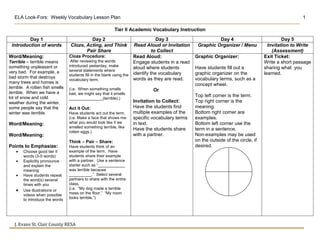
Weekly Vocabulary Lesson Plan
- 1. ELA Look-Fors: Weekly Vocabulary Lesson Plan 1 Tier II Academic Vocabulary Instruction Day 1 Introduction of words Word/Meaning: Terrible – terrible means something unpleasant or very bad. For example, a bad storm that destroys many trees and homes is terrible. A rotten fish smells terrible. When we have a lot of snow and cold weather during the winter, some people say that the winter was terrible. Word/Meaning: Word/Meaning: Day 2 Cloze, Acting, and Think Pair Share Day 3 Read Aloud or Invitation to Collect Cloze Procedure: Read Aloud: After reviewing the words Engage students in a read introduced yesterday, make aloud where students several statements where students fill in the blank using the identify the vocabulary words as they are read. vocabulary term. (i.e. When something smells bad, we might say that it smells _______________(terrible).) Act it Out: Have students act out the term. (i.e. Make a face that shows me what you would look like if we smelled something terrible, like rotten eggs.) Think – Pair – Share: Points to Emphasize: Choose good tier II words (3-5 words) Explicitly pronounce and explain the meaning Have students repeat the word(s) several times with you Use illustrations or videos when possible to introduce the words Have students think of an example of the term. Have students share their example with a partner. Use a sentence starter such as “____________ was terrible because __________.” Select several partners to share with the entire class. (i.e. “My dog made a terrible mess on the floor.” “My room looks terrible.”) J. Evans St. Clair County RESA Day 4 Graphic Organizer / Menu Graphic Organizer: Have students fill out a graphic organizer on the vocabulary terms, such as a concept wheel. Or Invitation to Collect: Have the students find multiple examples of the specific vocabulary terms in text. Have the students share with a partner. Top left corner is the term. Top right corner is the meaning. Bottom right corner are examples. Bottom left corner use the term in a sentence. Non-examples may be used on the outside of the circle, if desired. Day 5 Invitation to Write (Assessment) Exit Ticket: Write a short passage sharing what you learned.
- 2. ELA Look-Fors: Weekly Vocabulary Lesson Plan 2 In addition to the graphic organizer on day 4, teachers may wish to set up centers or a menu of choices to extend the learning. For example: Anchor Charts or Posters - Have students created their own anchor charts based on the academic vocabulary learned during the week. Examples vs. Non-examples Questioning – Have students answer questions such as “Would you prefer to have terrible day or an ordinary day?” or have students create examples from a question such as “What is something terrible that someone might do?” Real Life Experiences – Have students experience real life examples of the terms and respond accordingly in writing. For example, if you are studying “more than” and “less than” in math, set up a center with student weight items on a scale and respond, “_______________ weighs more than _________________.” Etc. Pantomime – Have students show how the vocabulary terms would be acted out such as “How an eagle soars.” Storytelling – have students tell stories including the vocabulary terms. Synonyms and Antonyms – Have students find synonyms and antonyms for the academic vocabulary terms they are studying. Illustration – Have students illustrate the academic vocabulary terms. Word Search – Have students look through books to find the terms. Substitution – Have students find places in their own writing or in other literature where they could substitute the new term for one that is already there. Hands-on Activities – provide opportunities for students to discover new understandings with hands-on activities. Real World – Have students find real world examples of the terms. Problem Solving – Provide students with a real world problem involving the academic vocabulary term, and have them work with a partner to solve it. Transfer/Multiple Meanings – Provide students with opportunities for them to transfer their learning of the new word so they understand what the same term may mean in math, science, social studies, reading or writing. Commercial – Have students create a commercial or a pamphlet of the term. Technology – Have students use technology to create a visual representation of the vocabulary terms. Be sure to select relevant activities for students to do. As Charlotte Danielson states, “When I walk into a classroom, of course I care about what the teacher is doing, but in some ways I care even more about what the students are doing. What’s the nature of the task? Are students being invited, or even required, to think? Naturally, that has implications for what the teacher is doing and what the teacher has already done. That is, has the teacher designed learning experiences for kids that engage them in thinking or formulating and testing hypothesizes or challenging one another respectfully or developing an understanding of a concept? You really only know what a teacher is doing when you look at what the students are doing. I also listen carefully to how teachers question students – if they ask kids to explain their thinking, for instance. That’s very different from just saying that’s the right or wrong answer. It’s a very different mindset about wanting to understand the students’ thinking and their degree and level of understanding.” J. Evans St. Clair County RESA